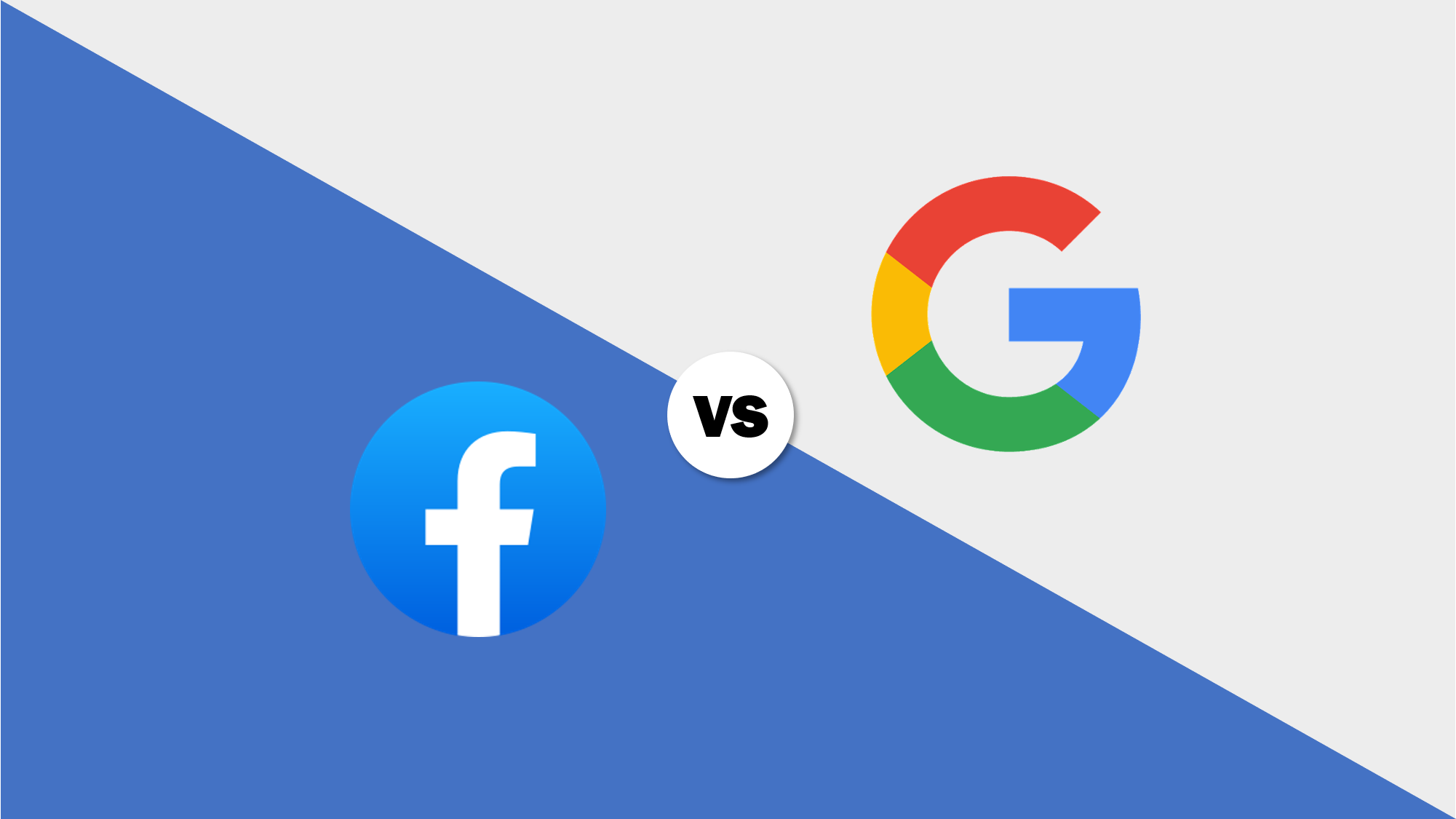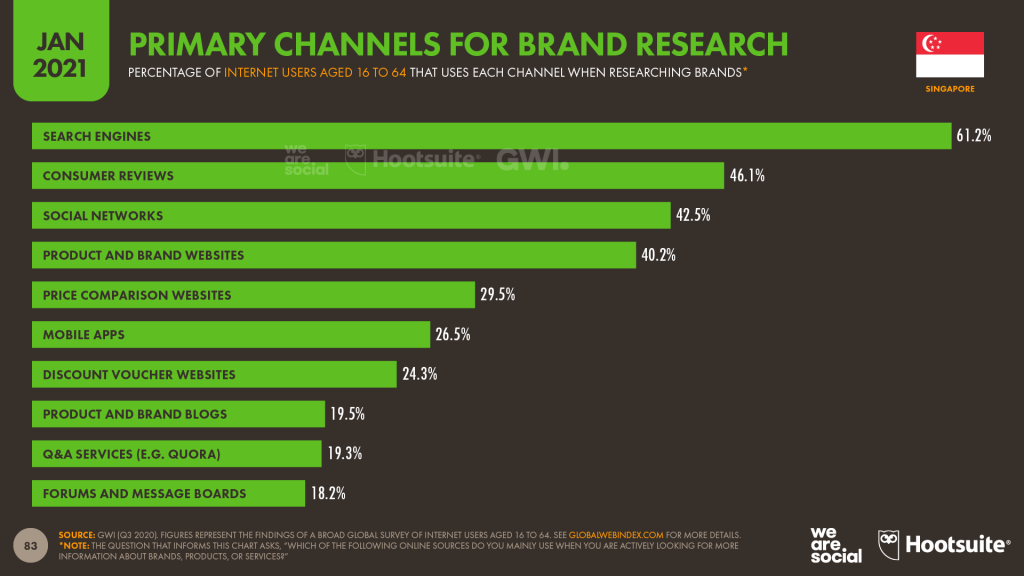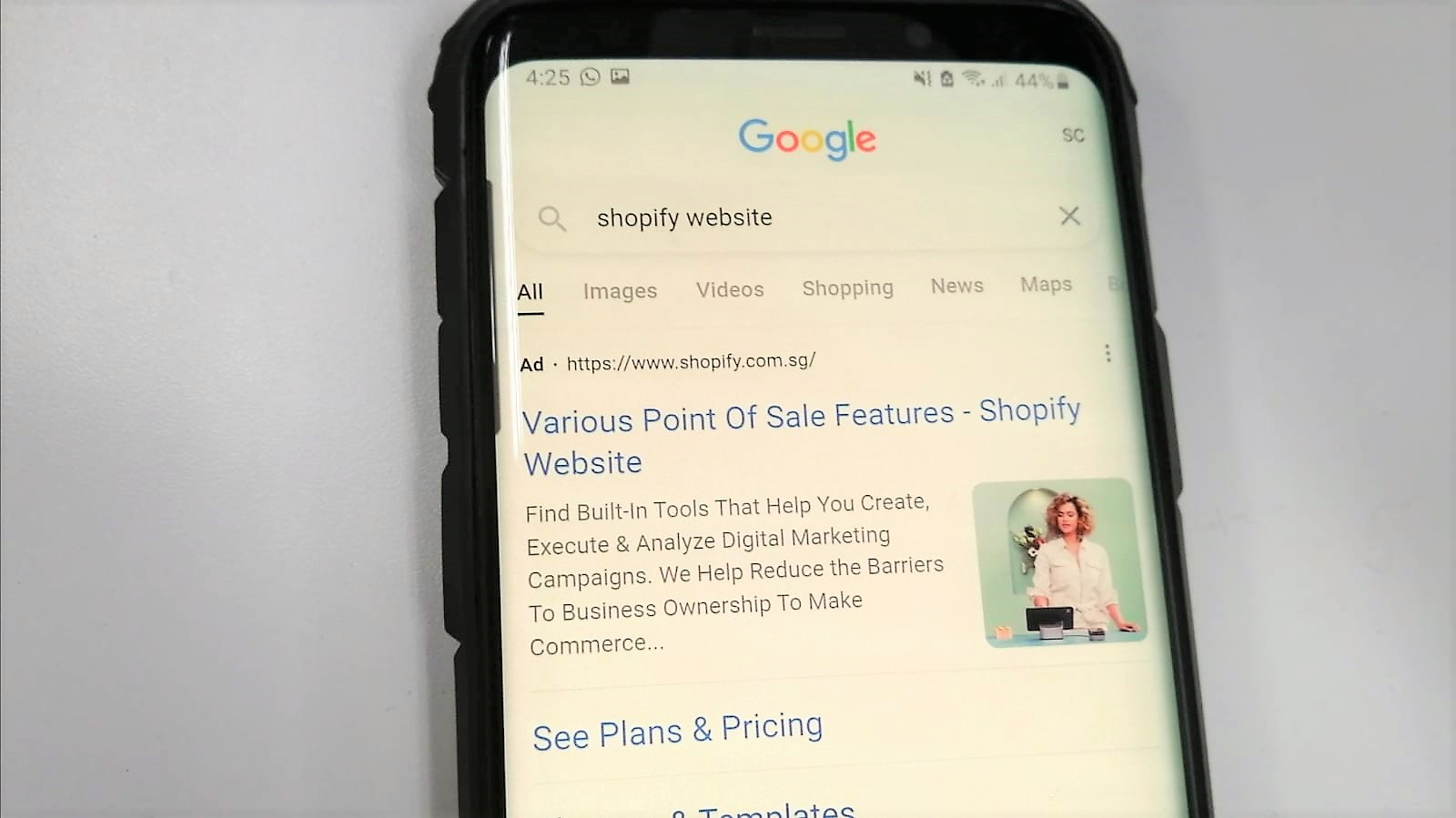
SINGAPORE – These days, it seems like everyone is touting the value of digital marketing and turning to online advertising, and for good reason too. If we wanted to reach thousands of Singaporeans islandwide in the past, we had to turn to mass media like newspapers and magazines. In comparison, online advertising alone allows us to reach 5.29 million internet users in Singapore.
Do you know that there are up to 4.68M Facebook users in Singapore in 2021? Do you know that there are more than 250m paths someone can take when using Google search? These stats alone should give you a peek into how big these platforms are. We’ve established that your potential reach on these platforms is huge, but what’s the difference between advertising on either one — and more importantly, is one or the other more suitable for your business?
Singapore is tiny, but Singaporeans are nothing if not expressive (loud and proud). So perhaps it’s no surprise that Facebook and Google are two of the most used social media platforms here. You may think that once your business has been listed on Google, reaching your target audience would be a cinch. Right? Well, there’s a lot more to Facebook Ads and Google Ads than meets the eye.
Businesses, big and small, use both Google and Facebook to promote their products and services, but this doesn’t mean they are entirely similar. Both advertising platforms work towards the same goal — improving your online brand visibility and increasing your revenue. But each platform also has its own unique set of strengths and weaknesses.
As a small business owner, you could be well within your rights to be asking yourself: “if I was starting from ground zero today, which would I pick — Facebook Ads or Google Ads?” While both platforms are powerful tools for small businesses looking to reach a wider audience, they each have unique strengths and weaknesses.
Facebook Ads vs Google Ads: What’s the Difference?
The biggest difference between the two is that Facebook Ads is an advertising platform built specifically for social media, whereas Google Ads is a search engine advertising platform that has been adapted for social media.
For example, Facebook ads allow you to directly target who you want to advertise to through custom audiences and ad retargeting. Consumers will see your ads while they spend time on social media, and you can also make use of Facebook’s Messenger chatbot to engage your customers.
On the other hand, Google Ads offer a variety of advertising tools such as search ads, display ads, and YouTube ads that can help you reach consumers at every stage of their purchasing journey.
Pros of Facebook Ads
Optimisation
Facebook offers advanced targeting features that allow advertisers to bid on phrases or keywords and reach people based on their age, interests, or location. You can even target users by their relationship status or education level.
If you’re running a small business, you can target employees of companies within a certain radius of your location so that they’ll come in to eat at lunchtime. Or, if you’re part of a local group, you can target people who live in the same city or state as the group members. And those are just two examples; the possibilities are endless with Facebook’s targeting capabilities.
Data Analytics
Facebook provides detailed data about your campaign performance on an easy-to-read dashboard. This includes cost per click (CPC), impressions and reach statistics, as well as which of your ads performed best so you can create more like them in the future. The CPC on Facebook ads is generally much lower than what you’ll find on Google Ads campaigns.
Also, while Facebook has limited real estate available for ads, there are no costs associated with how many times your ad is shown to users, which is known as impressions. With Google Ads, every time someone sees your advertisement, it counts as an impression and will cost you money.
The ability to spend as little or as much as desired on Facebook advertising makes it easy for smaller businesses without big budgets to get started with their marketing efforts.
Who should use Facebook ads?
If it’s important that your ads reach as many relevant customers as possible, then Facebook ads are a great option. They’ve taken off in the last few years with the rise of social media marketing. You can also target users more accurately. On Google, you’re limited to targeting based on keywords and interest categories. But with Facebook, you can go much deeper and target people by age, location, and interests, making it easier to reach your core audience.
Pros of Google Ads
Reach
Google Ads has the potential to reach more people than Facebook Ads because it’s used by more people worldwide. According to Statista, there are 2.5 billion monthly active users on Google and 2.47 billion monthly active users on Facebook as of Q2 2019. Since it’s not just limited to people with Facebook accounts, the platform gives you access to a much larger audience; anyone who uses Google will see your ads (even if they haven’t signed up for a Facebook account).
With Google’s search engine marketing (SEM) products like AdWords and AdSense, advertisers have access to an enormous amount of data about their target audience. Through these programs, you can choose from different types of advertising based on demographics, interests, behaviours and more than they could ever hope to know with Facebook ads alone.
Targeting
Google Ads has an advantage in this area because of its huge user base. The search engine giant’s tracking system allows you to target prospective customers based on web usage and location. Facebook advertising also tracks web usage but does not have as large a user base as Google.
Google Ads also allows you to target users based on their search intent, while Facebook Ads allows you to target users based on their demographics (age, gender), interests (tv shows watched or food eaten), behaviours (travel preferences or type of device used) and connections (friends who’ve liked a page).
Who should use Google ads?
If you know what keywords might be used by potential customers to search for your products, then you should probably use Google ads. They’re fairly easy to set up and can be inexpensive if you know how to create an effective campaign. If, however, you don’t know what terms people might use to search for your products or company, then it’s worth spending time searching through Google Trends data to figure out what those terms might be.
Which platform is a better investment?
Google vs Facebook, the eternal battle. Both are excellent marketing platforms that you can use to help grow your business. But which platform is better? Which platform will provide higher ROI (return on investment) for my small business?
Cost of Advertising
Both Facebook and Google have different tiers of ad packages depending on the size of the business and budget. The lower the budget, the more affordable the costs are for advertising.
However, if you’re looking to promote your company for less than $30 a day, Facebook is cheaper than Google Ads.
Facebook offers three tiers of ads: the Reach campaign ($10-$15), Boost Post campaign ($5-$10), and Promote Page campaign ($5-$10). These prices are based on optimal ad performance but can be adjusted depending on user behaviour. For example, if users respond well to ads they see in their News Feed, Facebook’s algorithm will increase the amount you’ll have to pay per click. Otherwise, Facebook will decrease it.
Here are a few important things to consider before you decide to invest in paid ads.
What’s your marketing objective?
When running an ad campaign, the most important thing is to know what you want out of it. Are you looking to increase brand awareness, create engagement opportunities with your target audience, or boost sales directly? This will determine which platform is better for you.
If you’re looking to increase brand awareness, Facebook Ads is the right platform for you. Facebook has over 1.4 billion daily users and 2.7 billion monthly users, so there’s no doubt that many people will see your brand on this platform. The ads can be displayed in the form of videos, images and text on users’ news feeds and sidebars, so there are also many ways for your ads to stand out from the rest.
If you’re looking to boost sales directly, Google Ads might be better for you because customers will see these ads when they search for terms related to what you’re offering. For example, if a customer searches “where can I get a new phone?” on Google, they will see advertisements related to smartphones at the top of their search results.
Which has better ease of use?
So which social media platform should you advertise your SME on: Facebook Ads or Google Ads? Here’s a quick overview of their features and is more likely to help your business meet its goals.
Facebook Ads offers |
Google Ads offers |
|
|
Ease of use
Both Google Ads and Facebook Ads are relatively easy to use once you learn the ropes; however, Google Ads has fewer features that could trip business owners up when strategising their campaigns.
Facebook ad campaigns are easy to set up and manage. It just takes a few minutes to set up an account and create an ad campaign using Facebook’s self-serve advertising platform, which lets you choose your budget and how long you want your ads to run upfront. It also allows you to see detailed statistics about your campaign once it goes live so you can monitor its performance and make changes as needed.
Results
For most businesses, especially those in the B2B space, Google Ads results are better than those generated by Facebook Ads. However, if your company is B2C, Facebook ads might work better for you because they target groups more accurately and adjust more quickly to market changes.
Summary
The two companies offer fundamentally different options. Facebook provides a range of ways to target users, including demographic information, interests, behaviours and connections to friends who have already expressed an interest in your product or service (called custom audiences). You can also target people based on their offline behaviour, such as whether they’ve visited your website or interacted with your mobile app.
For example, Google offers more broad-based targeting options by geography or interest. You can also create remarketing lists from people who’ve visited your site before. Also, be aware that some types of Facebook ads are available only through Facebook Boost, which requires a separate budget from your Facebook ads.
If you’re looking to engage and build an audience on Facebook, then Facebook Ads will be better suited for you. If you want to get the most out of your ad spend and run a highly targeted campaign, Google Ads will better suit your business needs.
In a nutshell, Facebook Ads are better for engaging customers and reaching a specific audience with visually appealing ads. Whereas Google Ads are better for generating conversions and optimising to get in front of an audience searching for what you offer. Consider the benefits of each and then create a plan to use both to their full potential.
Want to learn more about Facebook advertising? Sign up for Facebook marketing course.
Or register for a Google Ads course, if you want to find out more on how to set up & launch your Google Ads campaign.




